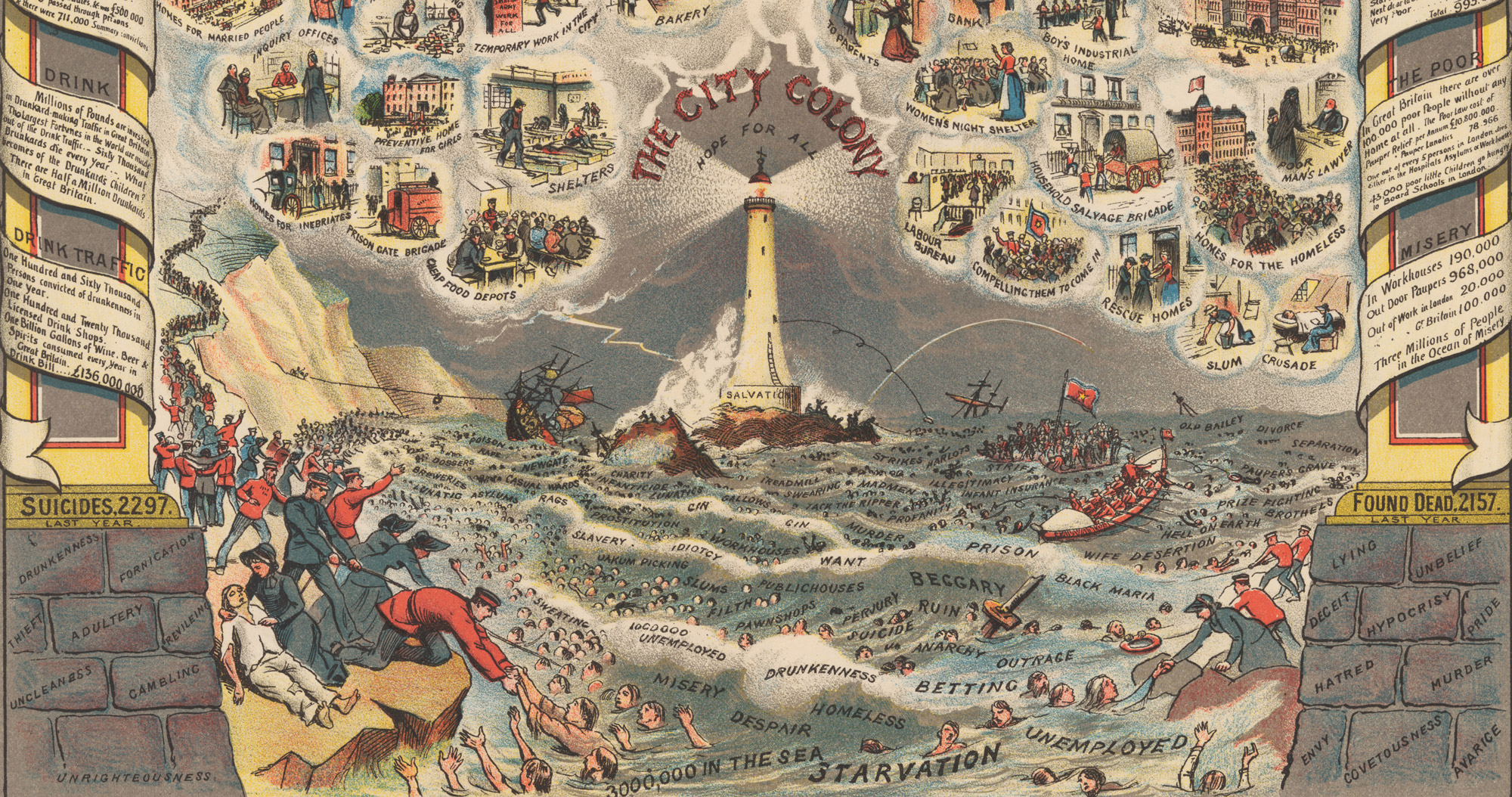When Jesus announced the coming of God’s Kingdom, His desire was that His Kingdom ekklesia (generally translated as ‘church’ in most English Bible translations) would be a model to the world and demonstrate how society should be governed in order to flourish.
Sadly today, the world does not look to the Church for answers to societal problems, but rather considers it to be largely irrelevant. Thankfully, there are some Christians and organisations that do have a voice in society and culture.1
A Nation Discipler
William Booth, the founder of The Salvation Army, was someone who sought to disciple his nation. Interestingly, as an evangelist, Booth initially thought that social reform was a distraction from the priority task of ‘winning souls’. However, he later embraced a wholistic view of the gospel which led him to change his mind and seek the redemption and transformation of society as well.
A Blueprint to Transform a Nation
In 1890 he wrote a blueprint for tackling poverty and social exclusion in Victorian England. Interestingly, many of his proposals are still being used today.
Booth’s book, ‘In Darkest England and the Way Out’, proposed several social reforms and outlines how to tackle poverty, addiction, slavery, unemployment, and homelessness.2 Booth drew an analogy between the lives of the poor in England after the Industrial Revolution, with the apparent brutality of Central Africa at the time, hence the title of the book.
It became an immediate best-seller with 10,000 copies sold on the first day, rising to 115,000 copies within the first month. Booth’s radical ideas included:
- Hostels and night shelters for the homeless (The Salvation Army is still one of the largest homelessness charities in the UK, caring for more than 3,000 people)
- Waste recycling centres
- Skills workshops
- Job centres for the unemployed
- Access to banks and lawyers for the urban poor
- Places of refuge for women (e.g. safe houses).
The book was used as a blueprint for the present-day welfare state when set up by the British government in 1948. Many of Booth’s ideas were incorporated into the welfare state system.
Booth’s grand plan also transformed The Salvation Army from a successful, but small evangelical church in England, to a global Christian mission that has transformed the lives of millions of people around the world.
Kingdom Solutions for Today’s Problems
Fast-forward 130 years and many of the problems William Booth sought to address are still with us today: unemployment, debt, alcohol abuse, modern forms of slavery, a lack of affordable housing and people who are homeless.
Where are the modern-day William Booths who, with the insight and wisdom from the Holy Spirit, will propose Kingdom solutions that will bless our cities, communities, and nation?
God’s people should be at the forefront of finding and proposing answers to issues in their local communities or at a national level. I don’t presume to have the answers, but God is wanting to share His solutions with us. Many times, we do not hear because we are not listening or expecting the King to be communicating with us only on certain issues. Where solutions to so-called ‘secular’ issues are required, often we don’t think God is really interested in such matters.3
The answers to societal ills will not be found in government, whichever party is in power. Ultimately, the only solution to mankind’s problems, personally and at all levels of society, is the kingdom of God, submitting to His ways of ‘doing life’.
We are God’s Seed in Society
Jesus said that His kingdom grows in the world like seed planted in the ground, or like yeast mixed into a batch of dough. The seed is the word of His kingdom. It is also the sons and daughters of the kingdom.4 In other words, it is each one of us! We have been sown into the world to be a godly, kingdom influence.
God might use some of us to have a significant voice into society, like William Wilberforce who, with a group of friends, became political activists to outlaw the world slave trade and reform the moral values of the nation5, or Lord Shaftesbury who campaigned for workers’ rights, safety regulations, and the protection of women and children from exploitation in the workplace.6
Most of us won’t have such prominence, but our influence can still be significant as we engage with our friends, neighbours, work colleagues, social media contacts, or local communities. Jesus said His kingdom is like a tiny mustard seed which although small, can grow into a large tree which becomes a blessing to those around it.7
Speak Out and Shine!
At a time when there are dark forces at work seeking to silence voices that speak an opposing narrative, we must as God’s people encourage each other to stand strong and be a voice for God’s truth in the world. Jesus said the Gates of Hades – in other words, the forces of evil – will not prevail against His ekklesia,8 but we must resist the temptation to shrink back into a private religious faith that doesn’t speak prophetically into our nations.
Jesus said we are the salt of the earth, but we must not lose our saltiness. He said we are the light of the world, but we must not hide our light under a lampshade.9 We are to shine individually but also corporately as kingdom communities.10 As we demonstrate the good works of the kingdom and become a community or city of light, the world will see what society ought to be like and flourish as a result.
1 For example, in the UK this would include organisations like Christians Against Poverty, Voice for Justice UK, Christian Concern, The Christian Institute, and The Salvation Army
2 The Salvation Army has published a new book, ‘In Darkest England: 130 Years On’, as a tribute to the original, highlighting how Booth’s social action principles are still relevant today
(https://www.salvationarmy.org.uk/news/darkest-england-130-year-old-book-shines-light-modern-issues).
3 This subject is discussed in more detail in Peter Farmer’s and my book, Kingdom Mission: A Call to Disciple Nations, 2014, 2017
4 Matthew 13:19, 38
5 William Wilberforce and his friends – who were living in Clapham, England, and became known as ‘the Clapham Circle’ – reformed the depraved and self-indulgent world around them. Both in Parliament and outside members of the Clapham Circle campaigned on behalf of the poor and the oppressed. They founded schools for children from poor families; took up the cause of ‘climbing boys’ employed by chimney sweeps; introduced measures to limit the number of hours children could be employed (first child labour laws); introduced health and safety regulations in the industry; campaigned for better housing and living conditions in urban areas; and succeeded in removing more than one hundred crimes that carried the death penalty or deportation. These moral reforms not only changed England for the better, but the world too, abolishing the world slave trade (where Britain had more than fifty percent of the slave ships) and eventually achieving emancipation for all slaves in the British Empire. Wilberforce and other members of the Clapham group were also active in founding many charitable associations, probably more than eighty during their lifetimes.
6 This workingman’s hero is still honoured in London City by a statue in Piccadilly Circus, generally known as Eros, but officially The Angel of Christian Charity.
7 Matthew 13:31-32
8 Matthew 16:18. The Gates of Hades represent Satan’s attempt to enforce his control or influence over areas of society through governments and cultural mind-moulders such as education, the arts and entertainment, commerce and so on. The apostle Paul describes them as “rulers…powers…world forces of this darkness” and “spiritual forces of wickedness in the heavenly places” (Ephesians 6:12).
9 Matthew 5:13-16
10 Philippians 2:15


